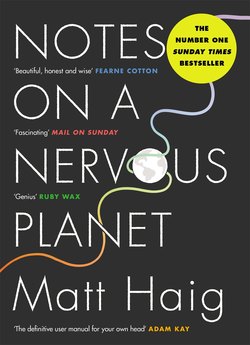Читать книгу Notes on a Nervous Planet - Matt Haig - Страница 13
На сайте Литреса книга снята с продажи.
ОглавлениеNews from a nervous planet
AS I BEGAN researching I quickly found some attention-grabbing headlines for an attention-grabbing age. Of course, news is almost designed to stress us out. If it was designed to keep us calm it wouldn’t be news. It would be yoga. Or a puppy. So there is an irony about news companies reporting on anxiety while also making us anxious.
Anyway, here are some of those headlines:
STRESS AND SOCIAL MEDIA FUEL MENTAL HEALTH CRISIS AMONG GIRLS (The Guardian)
CHRONIC LONELINESS IS A MODERN-DAY EPIDEMIC (Forbes)
FACEBOOK ‘MAY MAKE YOU MISERABLE’, SAYS FACEBOOK (Sky News)
‘STEEP RISE’ IN SELF-HARM AMONG TEENAGERS (BBC)
WORKPLACE STRESS AFFECTS 73 PER CENT OF EMPLOYEES (The Australian)
STARK RISE IN EATING DISORDERS BLAMED ON OVEREXPOSURE TO CELEBRITIES’ BODIES (The Guardian)
SUICIDE ON CAMPUS AND THE PRESSURE OF PERFECTION (The New York Times)
WORKPLACE STRESS RISING SHARPLY (Radio New Zealand)
WILL ROBOTS TAKE OUR CHILDREN’S JOBS? (The New York Times)
STRESS, HOSTILITY RISING IN AMERICAN HIGH SCHOOLS IN TRUMP ERA (The Washington Post)
CHILDREN IN HONG KONG ARE RAISED TO EXCEL, NOT TO BE HAPPY (South China Morning Post)
HIGH ANXIETY: MORE AND MORE PEOPLE ARE TODAY TURNING TO DRUGS TO DEAL WITH STRESS (El País)
ARMY OF THERAPISTS TO BE SENT INTO SCHOOLS TO TACKLE ANXIETY EPIDEMIC (The Telegraph)
IS THE INTERNET GIVING US ALL ADHD? (The Washington Post)
‘OUR MINDS CAN BE HIJACKED’: THE TECH INSIDERS WHO FEAR A SMARTPHONE DYSTOPIA (The Guardian)
TEENAGERS ARE GROWING MORE ANXIOUS AND DEPRESSED (The Economist)
INSTAGRAM WORST SOCIAL MEDIA APP FOR YOUNG PEOPLE’S MENTAL HEALTH (CNN)
WHY ARE RATES OF SUICIDE SOARING ACROSS THE PLANET? (Alternet)
As I said, it is ironic that reading the news about how things are making us anxious and depressed actually can make us anxious, and that tells us as much as the headlines themselves.
The aim in this book isn’t to say that everything is a disaster and we’re all screwed, because we already have Twitter for that. No. The aim isn’t even to say that the modern world has uniformly worse problems than before. In some specific ways it is getting measurably better. In figures from the World Bank, the number of people worldwide living in severe economic hardship is falling radically, with over one billion people moving out of extreme poverty in the last thirty years. And think of all the millions of children’s lives around the globe saved by vaccinations. As Nicholas Kristof pointed out in a 2017 New York Times article, ‘if just about the worst thing that can happen is for a parent to lose a child, that’s about half as likely as it was in 1990.’ So for all the ongoing violence and intolerance and economic injustice prevalent in our species, there are – on the most global of scales – also reasons for pride and hope.
The problem is that each age poses a unique and complex set of challenges. And while many things have improved, not all things have. Inequalities still remain. And some new problems have arisen. People often live in fear, or feel inadequate, or even suicidal, when they have – materially – more than ever.
And I am keenly aware that the oft-used approach of pointing out a list of advantages of modern life, such as health and education and average income, does not help. It is like a wagging finger telling a depressed person to count her blessings because no one has died. This book seeks to recognise that what we feel is just as important as what we have. That mental wellbeing counts as much as physical wellbeing – indeed, that it is part of physical wellbeing. And that, on these terms, something is going wrong.
If the modern world is making us feel bad, then it doesn’t matter what else we have going for us, because feeling bad sucks. And feeling bad when we are told there is no reason to, well, that sucks even more.
I want this book to put these stressed-out headlines in context, and to look at how to protect ourselves in a world of potential panic. Because, whatever else we have going for ourselves, our minds are still vulnerable. Many mental health problems are quantifiably rising, and – if we believe our mental wellbeing is important – we need, quite desperately, to look at what might be behind these changes.
